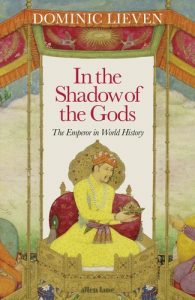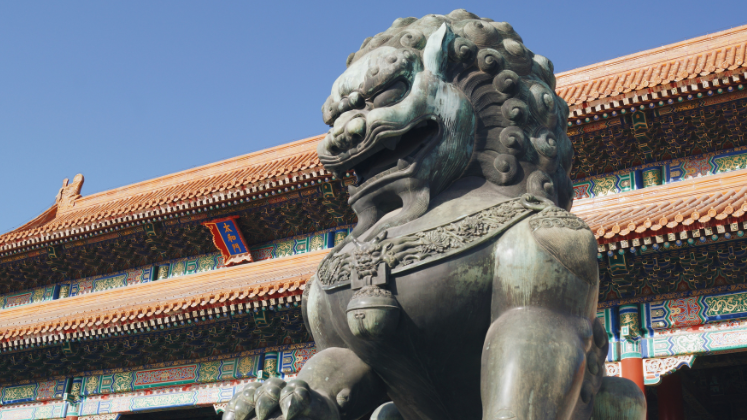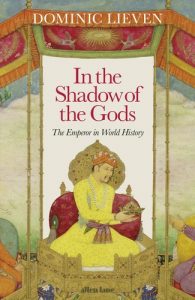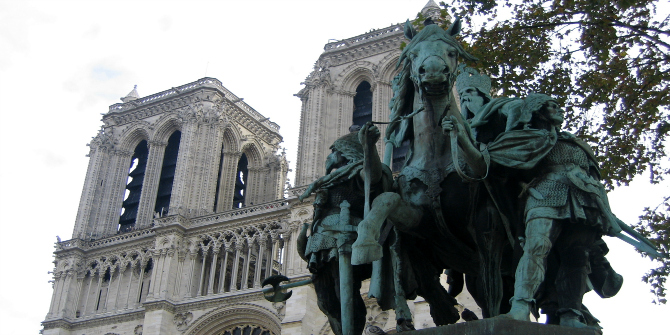In In the Shadow of the Gods: The Emperor in World History, Dominic Lieven examines the position of the emperor across multiple centuries and continents. This book is a triumph, writes Danny Pucknell, grappling with the personal and political ebbs and flows of dynastic rule across time.
This book review has been translated into Mandarin by Patrick McMaster (LN814, teacher Dr Lijing Shi) as part of the LSE Reviews in Translation project, a collaboration between LSE Language Centre and LSE Review of Books. Please scroll down to read this translation or click here.
In the Shadow of the Gods: The Emperor in World History. Dominic Lieven. Allen Lane. 2022.
Find this book (affiliate link):![]()
 Having become a household name and renowned expert in the history of Imperial Russia, it may be surprising that Professor Dominic Lieven has produced a work that appears so different in subject and scope from his previous highly acclaimed efforts. In the Shadow of the Gods examines the position of an absolute ruler across not one empire but many, taking in multiple centuries and continents in the process. To define and accurately contextualise the political role of an ‘emperor’ is a daunting challenge for any author, particularly in a single volume. Yet this is precisely what Lieven has set out to do in his handsome new book.
Having become a household name and renowned expert in the history of Imperial Russia, it may be surprising that Professor Dominic Lieven has produced a work that appears so different in subject and scope from his previous highly acclaimed efforts. In the Shadow of the Gods examines the position of an absolute ruler across not one empire but many, taking in multiple centuries and continents in the process. To define and accurately contextualise the political role of an ‘emperor’ is a daunting challenge for any author, particularly in a single volume. Yet this is precisely what Lieven has set out to do in his handsome new book.
From almost the first line, the author addresses the complexities of the task, declaring that most of us will begin this book with ‘the fatal illusion of believing we know what an emperor is’ (xiii). The major concern of In the Shadow of the Gods is the idea of the character of a ruler, allowing the reader to understand how empires functioned and why some were ultimately successful when others were not. In this manner, the book is a fine addition to scholarship on the concept of a ruler in its various forms and the systems in which they worked.
Not only does Lieven’s study build on successful literature around this topic, it also adopts a cross-comparative methodology in a similar vein to Dynasties by Jeroen Dunidam, which traces dynasties in Africa and Asia from 1300 to 1800. In the Shadow of the Gods takes an even wider span of time and narrows in on the particular ‘type’ of dynasties Lieven wishes to examine. Hereditary monarchies are the focus here, ranging from Persian Shahs to the Bourbon monarchs of France. In covering such a timespan and range of countries, it is admirable that the author clearly conveys the cultural contexts in which these different monarchies were formed and the circumstances in which many either flourished or floundered.

Image Credit: Photo by Gigi on Unsplash
To convey the concept of an ‘emperor’ clearly, Lieven constructs a sense of the political system in his chosen countries and eras, before addressing individual monarchs. This incorporates culture clashes and systems which seem alien to one another and, indeed at times, to the reader.
One such example is the Chinese emperor (known as the Son of Heaven). In this instance, the emperor’s role was largely ceremonial and based on the concept of ceremonial divinity. The emperor did not run the empire, but merely employed a Chancellor to manage it for them. Despite this, the position of some emperors appeared almost absolute, and we are told that a Chinese ruler could only be removed by the ‘mandate of heaven’, which decreed that a tyrannical or unfit ruler would eventually be removed by divine displeasure. While the power of the Chinese emperor was not exercised in the same way as some of the other rulers examined in the book, it is clear that his status was much more secure than those whose position was mainly based on military prowess.
Not only is the book a study of people and the mechanisms of rule, but there is also attention paid to religion throughout. The idea of a religious ruler and religiosity itself are key threads to Lieven’s argument as he traces the impact that emperors have had on the spread of religion throughout history. A ruler imbued with unshakeable religious beliefs can be a powerful ally to a fledgling faith, while conversely a ruler who has decided to pursue their own religious agenda can be disastrous. Lieven’s book can be said to be just as much about the Gods of faith as it is about some of the godlike figures who occupy its pages. We hear of Roman emperor Constantine’s reforming religious zeal and Egyptian pharaoh Amenhotep III’s attempts to remove the pantheon of Egyptian gods and replace them with his favoured deity.
The reform attempts of Amenhotep III and Constantine had widely different outcomes and can be said to address one of the deeper themes of the work: namely how empires are forged and what, if any, cohesive force can keep them together. For example, the spread of Islam on the steppes bound the lands of the Seluk dynasty together, while the damaging exclusion of Hindus by the Mughal Emperor Auranzeb left his military machine without the warrior Rajputs and weakened his forces substantially for the coming conflict with the East India Company. Interestingly, we see the concept of human frailty and religiosity brought together in several examples within the book: for example, Louis XV enabled what Lieven calls the ‘desacralisation’ of the French monarchy by refusing to touch victims of scrofula.
The second major concern of the work is the character of the individual rulers. The disconnection between the individual ruler and the office which they occupy has long been the subject of scholarly attention since Ernst Kantorowicz’s seminal 1957 work, The King’s Two Bodies. Kantorowicz asked how the individual person and the office they hold could be represented, and what this meant for the image and power of the dynasty of which they were the main actor. While Lieven does not delve into the theological considerations examined by Kantorowicz, he seeks to draw out the individuals from behind their offices, giving us a complete picture of the person instead of some vague, shadowy figure of absolute power.
There is something quite Suetonian about Lieven’s construction. Suetonius surveyed the personal and political lives of the first twelve Roman Emperors (including Julius Caesar) and allowed us to consider the strengths and weaknesses of their character, as well as their extremely human failings. Similarly, Lieven enables us to examine how character can be the definitive factor in the success of a ruler and, sometimes, an entire dynasty.
There are some minor troubles with the cavernous nature of the timespan and source material in the book: the chapters on the Roman Empire are brief and could do with being given more space to examine the system of governance. Although it would be fair to suggest that many studies of the Roman Empire already exist, an extension of this chapter which amalgamated the two strands of Lieven’s argument would have benefited the earlier part of the book.
At the heart of In the Shadow of the Gods lies the conundrum of leadership. Despite the supposed safety net of proper instruction in the business of rule, example after example in the book highlights that it is elements of the human condition, and how successfully a leader deals with their own bias, prejudices, pride and anger, that allow a dynasty to survive. Nicholas II of Russia responded too slowly to the problems of a modern world encroaching on the Tsarist idea of an absolute monarchy, leading to the collapse of Imperial Russia and the death of Nicholas and his family.
Overall, In the Shadow of the Gods is of value to both the scholar and the interested layperson, in grappling with the personal and political ebbs and flows of dynastic rule. The book is a triumph for Lieven, who has composed such a wide-ranging study while still returning to his intellectual home with the final chapter on the Russian Empire.
Note: This review gives the views of the author, and not the position of the LSE Review of Books blog, or of the London School of Economics and Political Science. The LSE RB blog may receive a small commission if you choose to make a purchase through the above Amazon affiliate link. This is entirely independent of the coverage of the book on LSE Review of Books.
Banner image credit: Photo by Rafik Wahba on Unsplash
 Dominic Lieven教授已经成为家喻户晓俄罗斯帝国史的专家,因此他写一部与他之前写过的话题和范围相差那么大的作品可能会令人惊讶。《众神之影》一书分析绝对统治者在多个帝国,多个时代和多个地方中的地位。对作者来说,如何定义和准确地描述“皇帝”的政治角色是一个艰巨的挑战, 尤其只在一本书中。然而,这正是Lieven在他“帅气”的新书中所要做的。
Dominic Lieven教授已经成为家喻户晓俄罗斯帝国史的专家,因此他写一部与他之前写过的话题和范围相差那么大的作品可能会令人惊讶。《众神之影》一书分析绝对统治者在多个帝国,多个时代和多个地方中的地位。对作者来说,如何定义和准确地描述“皇帝”的政治角色是一个艰巨的挑战, 尤其只在一本书中。然而,这正是Lieven在他“帅气”的新书中所要做的。
几乎从第一行开始,作者就承认这项任务的难度;他提出,大部分的人开始读这本书时,将带着“请相信我们知道什么是皇帝”的致命错觉。《众神之影》的主题围绕着统治者的品质,它让读者了解帝国如何运作,为何有一些会成功,为何有一些会失败。由此,这本书对关于统治者各种形式的概念以及其环境作出了精妙的学术贡献。
Lieven教授的研究不但发展了已经存在的学术,也采用了一种交叉比较方法,与Jeroen Dunidan的Dynasties类似。后者追溯了1300年至1800年的非洲和亚洲王朝。《众神之影》的时间范围更大,还具体地聚焦于 Lieven教授想要分析帝国的“种类”,就是世袭君主国;从波斯的沙阿到法国的波旁君王,都有涵盖。鉴于作者涵盖如此大的时间跨度和如此多的国家,还清楚地传达了这些不同君主国形成的文化背景,以及许多国家繁荣或陷入困境的环境,作者的功力令人佩服。
为了清晰地表达“皇帝”的概念,Lieven 在谈到个别君王之前,先构建其所选择的国家和时代的政治制度。它们包含了不同的文化冲突和文化体系,这些冲突和体系看起来彼此陌生,有时甚至对读者来说也是如此。
一个例子就是中国的皇帝(被称为“天子”)。皇帝的角色在很大程度上是仪式性的,基于仪式神性的概念。皇帝没有直接管理帝国,而是任命一位股肱之臣为他管理。尽管如此,皇帝享受绝对的地位。并且我们被告知,中国皇帝只能通过“天命”被推翻;指的是由于皇帝太暴虐或者不称职而被上天不满从而被推翻。虽然中国皇帝的权力与其他书里统治者的不一样,但很明显的是,“天子”的地位比靠军事实力的皇帝要稳定得多。
这本书不仅仅研究人物和统治的制度,而且始终关注宗教。而也分析宗教的影响。在Lieven 追溯皇帝对宗教传播影响的过程中,宗教统治者和宗教信仰本身的概念都是作者论点核心的线索。一个充满不可动摇宗教信仰的统治者可以成为全新信仰的强大盟友;相反,如果一个统治者决定追求自己宗教目的可能是灾难性的。Lieven的书可以说是既关于信仰之神,也关于那些书页之间像神一样的人物。读者将读到罗马皇帝君士坦丁改革宗教热情;以及埃及法老阿蒙霍特普三世试图移除埃及众神的万神殿,并用他最喜欢的神灵取而代之。

法老阿蒙霍特普三的改革试图和君士坦丁的结果有很大的区别,也代表书里的主题之一,即帝国是如何锻造的;以及,是什么力量将它们凝聚/团结在一起。比如说,伊斯兰教在草原上的传播使得塞卢克王朝 (Seluk dynasty)更加团结。然而,莫卧儿皇帝 Auranzeb 对印度教徒的破坏性排斥使他的军事机器失去了拉其普特勇士,在应对即将到来的与东印度公司的冲突中, 实力大减。有趣的是,读者在书里几个例子中能看到人类的弱点和宗教信仰的概念混在一起:例如,路易十五通过拒绝接触瘰疬的受害者,使Lieven所谓的法国君主制“去神圣化”(desacralisation)成为可能。
这本书的第二主题是关于统治者的个人气质。自Ernst Kantorowicz在1957年的开创性著作《国王的两个身体(The King’s Two Bodies)》以来,统治者个人与他们担任的职务之间的脱节一直是学术界关注的话题。Kantorowicz问的是: 如何展现个人与他们所担任的职务,以及这两点对他们作为王朝主要行动者的形象和权力产生什么样的影响。虽然Lieven没有深入研究Kantorowicz所考察的神学因素,但他力图将个人从他们的职务后面“凸显”出来,给我们一个完整的形象,而不是一些模糊的、朦胧的,绝对权力的形象。
Lieven作品的结构与苏埃托尼风格有很多相同。苏埃托尼观察了历史上十二个罗马皇帝(包括凯撒)的个人生活和政治生活,并让我们考虑他们性格的优缺点及其极度人性化的失败。同样,Lieven让我们看到性格如何成为一个统治者成功的决定性因素,甚至能成为整个王朝成功决定性的因素。
书中的时间跨度和原始材料的空洞性有一些小问题:关于罗马帝国的章过于短促,需要更多对治理体系的分析。虽然可以说已经有了许多关于罗马帝国的研究,但如果这一章的内容能将Lieven的两个论点融合在一起,将对本书的前半部分有所增进。
《众神之影》的核心是领导力难题。尽管有所谓的指导正确统治国家事务的安全网,但书中一个又一个的例子强调,正是人性的要素: 领导者如何成功地处理自己的偏见、骄傲和愤怒,才是一个王朝得以生存下去的关键。俄罗斯的尼古拉二世对现代世界的问题反应得太慢,导致了俄罗斯帝国的崩溃和全家灭亡。
总之,《众神之影》有力分析了王朝统治者个人和政治权力的流变, 对学者和感兴趣的普通人都很有价值。对Lieven个人而言,这本书也是凯旋而归 — 在构建了广泛的研究范围之后,他在最后一个章节回到了他的精神家园–俄罗斯帝国。







